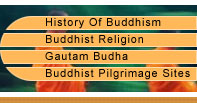It is believed that as Lord Buddha moved ahead on the path of Enlightenment, He remembered all of his previous lives. In Buddhism, life is considered as a 'samsara', which means continuous roving. Often known as reincarnation, rather than rebirth, the theory implies the transfer of the essence or the soul. It does not follow the law of causality or dependant origination, like in rebirth. The main aim of Buddhism is to break away the circle of samsara and reach a new level, known as Nirvana.
Lord Buddha reached the state of nirvana at the time of His enlightenment. After experiencing nirvana Himself, He decided to teach others the path to the same. According to Him, nirvana should be the ultimate goal of every individual. Forty-five years later, when He died, He passed through pari nirvana, the complete nirvana. Nirvana literally means extinguishing or unbinding. However, in Buddhism, nirvana means freedom from the constant cravings that we experience in life.
It means freedom everything that leads us to dissatisfaction, like desire, jealousy, greed, ignorance, etc. After a person attains this sense of freedom, he moves into a state of total ecstasy. All karmic debts get settled and he doesn't need to go through the cycle of birth and death again.
This article provides information about nirvana Buddhism. Find more info on Buddhism & nirvana.
Buddhist Temples: Nirvana Buddhism





